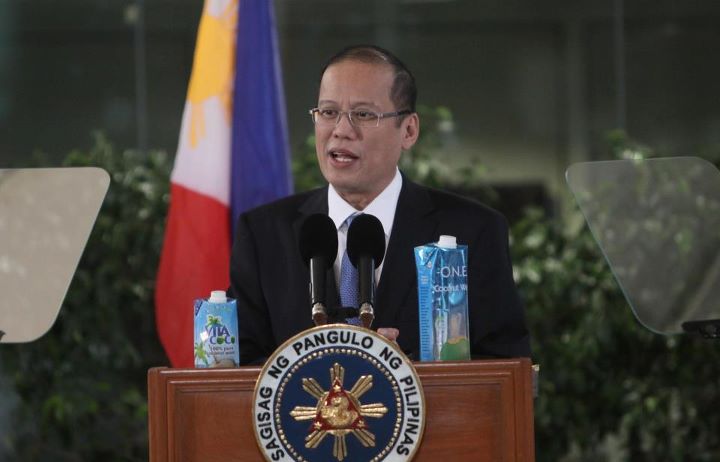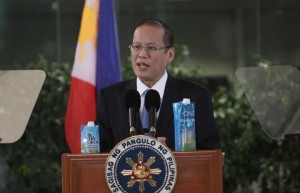
Speech of His Excellency Benigno S. Aquino III at the commencement exercises of the Philippine Military Academy Pudang Kalis Class ng 2013.
Earlier, I had to ask the Secretary of Defense if you were imitating his “tiger look.” Out of all the graduations I have attended, you are the only ones who seem intent on maintaining the grim look– as if you weren’t too happy to be graduating. Perhaps you’re just being professional. [Laughter]
It has been a yearly tradition for Presidents to come to Fort Del Pilar to greet and pay tribute to cadets who are graduating from the Philippine Military Academy. This is the third time I have been granted this honor, and I will never grow tired of celebrating this occasion with you—not only as your Commander-in-Chief, but also as personal witness to a triumph attained by the collective efforts of a united Filipino nation.
I say this, because, after all, is it not true that your march on this stage is a sign of the collective efforts of the wider society in helping you achieve your dreams? True; it was you who went through those tests, and it was you who rose at the crack of dawn for physical training; your shoulders bore the weight of so many sacrifices so that you can stand where you are today, and know that I hold deep admiration for you and for all that you have done.
We must also consider, however, that before being accepted as plebes here in the PMA, your families sacrificed much so that you could finish high school; their support remains a constant in your lives up to this very point. Your teachers and your advisers, too, stayed up nights to make sure they had lessons of worth to impart to you. And the entire nation played a part in founding and in maintaining the PMA as an institution, and their contributions and support will continue throughout your entire careers as members of the Armed Forces of the Philippines.
Your valedictorian, Jestoni Lanaja, in hurdling so many challenges, is the very example of this. He did not grow up well-off. His brother never had the chance to go to college, and his sister could not get her disability treated in hospitals. But through years of drawing palm wine, his father supported Jestoni until he became a cadet here in the PMA. Now, Jestoni bears the Presidential Saber, a symbol of the honor and of the great responsibility that comes with being class valedictorian.
Prolen Banacua, too, is a success story. Even before he became a soldier, he battled with and ultimately overcame Hodgkin’s lymphoma. Now, he is graduating at the third of your class. And I am sure that his pride and joy is equaled, and even perhaps surpassed, by his father, who worked as a machinist, and by his mother, a factory worker—both of whom strived to ensure that Prolen did not face cancer alone, and that their son would have a good future to look forward to, one made possible by a good education.
The Pudang Kalis Class of 2013 is Replete with these kinds of stories, of men and women who have battled through their share of hardship and emerged triumphant. From Maryam Balais, your salutatorian who fractured her hand during training, to Cadets Aragona, Gonzales, Landicho, and many other classmates who worked as fastfood crew members before entering the PMA—all of you are beneficiaries not only of your own hard work, but of the collective efforts of those around you.
This is the challenge that you must rise to: that the efforts and the sacrifices made by those who helped you succeed will give rise to an abiding sense of responsibility within you—that you will likewise dedicate time, energy, and the same kind of loyalty to your fellow men. The work of the entire Filipino people brought you to today’s triumph; it is my hope that your every action from here on is dedicated to this same people—because, after all, is it not true that all problems arise from those who think only of themselves and of their own interests?
Let us take as an example the situation in Sabah. Did its masterminds consider how their actions would affect the majority? We have an estimated 800,000 Filipinos quietly living and working in Sabah; what if they were suddenly turned away by the neighbors with whom we have painstakingly cultivated peace and trust? We already know how complicated this issue is: could any Malaysian Prime Minister so easily agree to let go of a land that, for so long, has been subject to their laws? Is there a Philippine President who would, without a second thought, give up our claim? I ask you to consider my position: whether or not the claims of those who went to Sabah are legitimate, how does one weigh actions against the lives and livelihoods that are put in danger, should an outright conflict begin? We all know that for every action, there is a resultant reaction, and that there are problems that cannot be solved hastily—problems that will only beget more problems if we try to solve them through force or recklessness.
What is needed here: a careful and truthful evaluation of the facts, and a subsequent negotiation along those lines, to produce the right solution.
Did the masterminds of this situation consider any of this as they provoked and aggravated the situation—as they gathered the funds needed to rent boats, to buy gasoline and food, guns and bullets? You would know this from your classes in Logistics; you know how much preparation is needed to transport two hundred people across a sea, and to arm a number of them. What was going on in the minds of those behind this incident?
It is clear: whoever was behind this only thought of themselves and of their own interests, disregarding those of their fellow men. And even if we believe that those who went to Sabah only wanted to stand up for what they believe in—wouldn’t it have been better for everyone involved if they did so through calm and reasonable discourse, in accordance with the law and the appropriate processes?
Let us look at the situation in the West Philippine Sea as an example. Is it not true that, like in the issue of Sabah, we continue to hold firm to principles founded on a rules-based approach, towards a peaceful resolution of the dispute over Bajo de Masinloc? If we were to resort to saber-rattling and violence, the problem would only grow bigger, and in all likelihood, would only carry over to the next generations.
We have already seen the positive fruits of dialogue with our countrymen who, like us, want the Bangsamoro to progress: earnest dialogue is more effective, more productive, and more beneficial to all, as opposed to pointing weapons at each other. Forbearance and reason are not equivalent to cowardice—on the contrary, these are the measures of true courage and resolve, because through these we are able to consider the well-being of not only those living in the here and now, but especially those in the years to come.
This is among the crossroads that you will face as soldiers. Will you allow emotions to cloud your judgment, or will you face challenges with calm? Will you take shortcuts to complete your work, or will you weigh carefully the effects that your actions and decisions will have on those that follow you? Will you pass on to the next desk the problems that arrive in front of you, or will you work with all your strength, all your zeal, all the heart and honor of the soldiers of a united people, to solve these problems, and keep them from burdening the next generations of Filipinos?
As the next leaders of our uniformed forces, you bear on your shoulders a grave responsibility. And as someone who is a little bit older than you, perhaps this is the lesson I can impart: whenever you face a dilemma, you need only put yourselves in the shoes of those that will be the most affected, the most abused, the poorest, those who are in most need of your protection—and I can promise you, what is right and what is wrong will become clearer. They who are in the margins of society, they who are our Bosses, the Filipino people—they are the ones who will set the direction we must take; so long as we always keep their well-being in mind, we will never stray.
You know, I have to be honest with you: being the President of the Philippines is not a job that keeps one youthful. There are some who say that I am in dire need of a vacation, because they see my eye-bags growing larger, and my hair growing even thinner. This is why I like visiting the PMA, because I have longer hair than you guys. [Laughter] A part of me that agrees with them—but a larger part tells me that I only have six years in office, six years to lay down the changes that we have long desired. We are almost at the midpoint of our term, and I am only encouraged by the successes that we have begun to reap one after the other.
This is why, like in your forced marches, no matter how heavy the weight I’m carrying, as long as I can move my right foot forward and follow it with my left—especially when I know that you and the rest of the Filipino nation stand behind me, ready to do your part to uplift our society—we will continue marching towards the fulfillment of our dreams.
I tell you the same thing I said to the classes that came before you: the time for training is done, the time for theories is done, the four years of vacation you have spent in Fort del Pilar is done; today, you begin to put what you learned into practice. Go forth, and show our nation that it was not wrong in selecting you as part of Pudang Kalis Class of 2013 of the Philippine Military Academy.
Thank you, and a good day to all.

